She's not the first Indian woman to direct films but Sai Paranjpye's contribution ranks among the most significant.
Enchanted by the art of story-telling and the scale of imagination at a very young itself, Paranjpye, born to a Maharashtrian mother (actor, social worker Shakuntala) and Russian father (watercolour artist Youra Sleptzoff) would go on to use her gifts of observation and writing to render vibrant, insightful, realistic cinema. She spent a considerable part of her childhood in Australia.
Though the marriage of her parents didn't last long, Paranjpye's Padma Bhushan-recipient mother ensured she stayed unaffected and educated in multiple languages and get good exposure of various cultures and literature.
Creative beginnings
Image: Shabana Azmi and Naseeruddin Shah in SparshNaturally drawn to the creative medium, Paranjpye left her home in Pune to complete her graduation from the National School of Drama in Delhi.
And from this point, there was no looking back.
From a stint as radio announcer at All India Radio to writing several Children's plays in English, Marathi and Hindi leading to her first award-winning made-for-television film, The Little Tea Shop for Doordarshan (where she later worked as a producer), Paranjpye was on a roll.
Her keen ability to blend message and fantasy led to meaningful children's films like Jadoo Ka Shankh, about a wish-granting magical conch and Sikander, where a bunch of kids secretly shelter a puppy dog.
Paranjpye's talent, however, became truly widespread with the Naseeruddin Shah-Shabana Azmi, Sparsh.
A mature love story, set against the backdrop of a blind school, Sparsh is a touching tale of two wounded souls finding companionship.
While Azmi is expectedly restrained, it's Shah's career-best performance as the defensive blind principal unable to tell love from pity that truly stands out against Paranjpye's stirring script.
Sparsh went on to win two National awards for Best Actor and Screenplay.
Comic relief
Image: Movie poster of Chashme BuddoorAfter Sparsh, Paranjpye decided to let her down with the subsequent project, Chashme Buddoor.
A rewritten version of her teleplay Dhuan Dhuan, the 1981 comedy starring Farooq Shaikh, Deepti Naval, Ravi Baswani, Rakesh Bedi, Saeed Jaffrey and Leela Mishra is about three friends falling for the same girl. While one is serious, the other two are legendary scoundrels.
The amusing adventures it leads to forms the crux of the plot.
Chashme Buddoor was an instant success and further established Paranjpye's versatility as a filmmaker.
Tell-tale signs
Image: Movie poster of KathaWriting wit appealed to Paranjpye and she followed Chashme Buddoor with Katha, a satire on the classic hare and tortoise fable against the backdrop of a chawl.
The filmmaker repeated most of the cast from her first two films -- Shaikh, Shah, Naval and Mishra. Her daughter Winnie, who had a fleeting cameo in Chashme Buddoor, was assigned a brief role in Katha.
Once again, she was showered with acclaim for her effortless blend of humour and irony and creating lasting cinematic brilliance without succumbing to the star-dictated system of Bollywood.
Changing directions
Image: Aruna Irani and Shabana Azmi in SaazAlthough the 1980s are considered to be the most dull and excessive decade in cinema, it proved to be the most fecund phase of Paranjpye's movie career.
After Katha, she diverted her attention to small screen with breezy serials like Ados Pados, Chhote Bade and yet another television film, Angootha Chaap.
In 1990, she returned to make her personal favourite, Disha with Nana Patekar, Om Puri and Shabana Azmi, a hard-hitting subject, which highlights the miserable living conditions of immigrant workers working in urban set-ups.
But at this point, Bollywood was much too caught with college-oriented musicals and standard action dramas to appreciate the gravity of Disha.
By the end of the 1990s, the playwright and author of books like Nana Phadnavis (for children) and Rigmarole And Other Plays roped in Azmi yet again, along with Aruna Irani (delivering one of her best works), for Saaz.
A rewarding journey
Image: Movie poster of SaazSaid to be a fictional account of the real-life rivalry between playback legends and sisters, Lata Mangeshkar and Asha Bhosle, Saaz boasted of compelling performances, a melodious soundtrack but met with a mixed response.
The new millennium saw her return to her favourite genre, children's film with Bhago Bhoot while continuing her active role in making documentaries like Choodiyan and Suee, writing plays and hosting workshops.
In 2006, Paranjpye was awarded with the prestigious title of Padma Bhushan for her many artistic endeavours.
While the screens ready to re-release her much-adored handiwork, Chashme Buddoor this Friday, along with its official remake by David Dhawan, the 75-year-old today is more than happy with her role as an accomplished creative, a content mother and a doting grandmother.


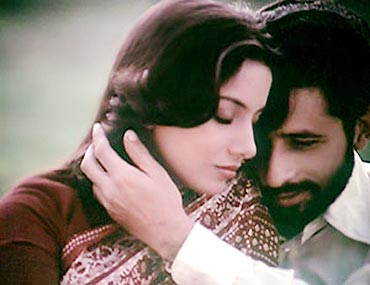
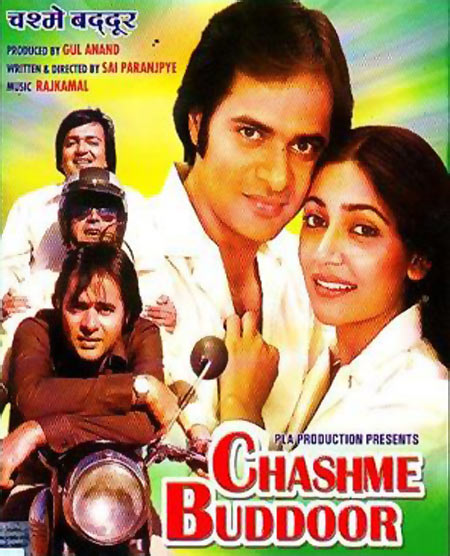
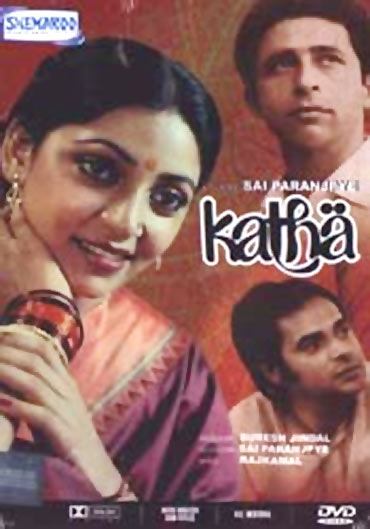
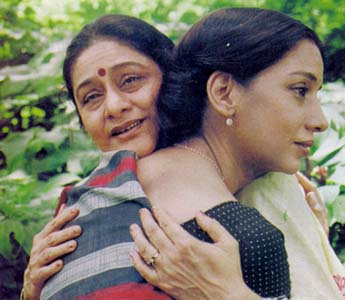
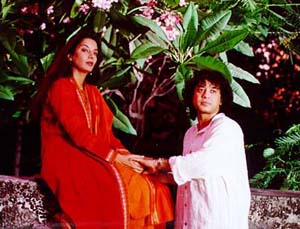
Comment
article